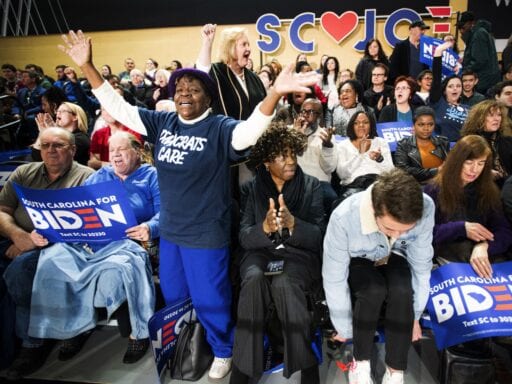Biden said African Americans would power a victory in South Carolina, and they did — he received 61 percent of the black vote.
Throughout his campaign for South Carolina, former Vice President Joe Biden has repeatedly stated that his appeal among black voters meant he would win that primary.
Exit poll data from Saturday’s contest now shows his confidence to be justified.
Biden won the South Carolina primary handily, with almost half of all votes. And he led by even more among African American voters, winning 61 percent of the black vote, placing him 44 percentage points ahead of his competitors for that key demographic, according to an exit poll from the Washington Post. His closest competitor among black voters, Sen. Bernie Sanders, received just 17 percent of that vote.
Biden, of course, had some advantages Sanders does not. He was boosted by being a known quantity, particularly to older black voters, thanks to a long career in the senate and his role as vice president to Barack Obama. He also clinched a key endorsement from Rep. Jim Clyburn, a prominent black Democrat and South Carolina kingmaker, in the final days of the primary race.
/cdn.vox-cdn.com/uploads/chorus_asset/file/19758235/GettyImages_1209579092.jpg) Spencer Platt/Getty Images
Spencer Platt/Getty ImagesBut even outside of the state, Biden has consistently polled the highest among black voters, and pointed to that support as evidence of why, despite poor showings in Iowa and New Hampshire, his campaign would bounce back once the race reached states with diverse populations.
“I want you all to think of a number: 99.9 percent,” he told supporters in South Carolina as his fifth-place finish in New Hampshire was unfolding. “That’s the percentage of African American voters who have not yet had a chance to vote in America.”
And indeed, he followed up that loss in New Hampshire with a second place finish in Nevada, powered in part by the fact that he won among black voters in that state. And that result set the stage for his significant win in South Carolina, a state where the Democratic electorate is more than 60 percent black.
But, of course, black voters are not a monolith, and one group of black voters in particular turned to a different candidate. The South Carolina primary’s second place finisher, Vermont senator Bernie Sanders, picked up just 17 percent of black voters according to the Post’s polling, but, notably won — albeit by 2 percentage points — among black voters under 30, according to an NBC News exit poll.
Some young black activists have pointed to Biden’s support for the 1994 crime bill and recent bumbling moments about forced busing as reasons for not supporting him. As Vox’s Li Zhou has reported:
Younger black voters who spoke with Vox have emphasized that they are interested in more ambitious policies than the ones Biden has championed. Many older black voters also cited Biden’s work alongside former President Barack Obama as a major asset, though younger voters did not weigh these efforts as strongly.
“I think there’s a generational gap between younger African Americans and older African Americans,” South Carolina state Rep. Kambrell Garvin, a Warren surrogate, previously told Vox. “Younger African Americans like Joe Biden, but a lot of us aren’t supportive of Joe Biden, because we want a change in policies. We aren’t looking to tinker around the edges.”
Meanwhile, former South Bend Mayor Pete Buttigieg and Minnesota Sen. Amy Klobuchar have both struggled to make any inroads among black voters, a difficulty exemplified first in Nevada, and again in South Carolina.
Candidates who consistently rate poorly among black voters — a group that comprises 20 percent of the national Democratic electorate — are going to struggle to achieve the kind of coalition needed to compete nationally. That’s especially significant going into Super Tuesday, when significantly more diverse states, including California, Texas, North Carolina and Virginia, will cast their ballots.
As Zhou has written, “South Carolina is the first big test of the amount of backing candidates can rally from black voters.” Biden has passed that test, as he’d said he would. Other candidates, however, would appear to have cause for concern.
Author: Anya van Wagtendonk
Read More



